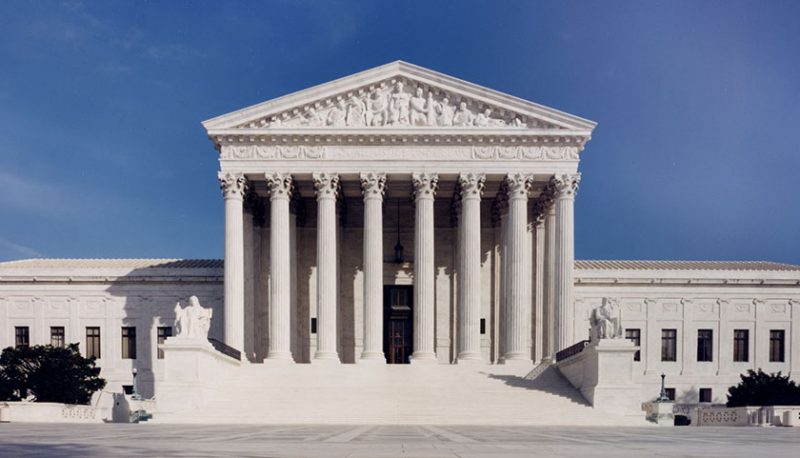“Confirmed Judges, Confirmed Fears” is a blog series documenting the harmful impact of President Trump’s judges on Americans’ rights and liberties. Cases in the series can be found by issue and by judge at this link.
Trump Third Circuit judge Stephanos Bibas argued in dissent that the federal law banning people convicted of felonies from possessing firearms should be overturned, at least as applied to someone convicted of tax fraud. The dissent is similar to one by now-Justice Amy Coney Barrett in the Kanter case when she was on the Seventh Circuit. The Third Circuit majority rejected Bibas’ view and upheld the law in its November 2020 decision in Folajtar v. Attorney General.
Lisa Folajtar pled guilty and was convicted of tax fraud for willfully making a false statement on her tax returns, a felony punishable by up to three years’ imprisonment and a $100,000 fine. She was sentenced to three years of probation and a $10,000 fine and had to repay over $250,000 in back taxes, penalties, and interest. Even though a federal law prohibits firearms possession by anyone convicted of a felony, Folajtar filed suit, claiming that as applied to her, the law was unconstitutional under the Second Amendment. The district court rejected the claim and the case was appealed to the Third Circuit.
In a 2-1 decision, the Third Circuit affirmed. The majority noted that the Supreme Court has “repeatedly endorsed the constitutionality of measures prohibiting firearms possession by felons,” starting with the Heller decision, and that “every court to consider the issue” had “rejected challenges” that the federal law on its face violates the Second Amendment. Some courts like the Third Circuit have permitted challenges to such laws by individuals as applied to them, the majority continued, but only people convicted of relatively minor misdemeanors had prevailed in such cases. Precedent shows that any person who has committed “a serious criminal offense, violent or nonviolent,” is outside the scope of the Second Amendment, the majority elaborated, and under that test, Folajtar’s challenge failed.
Relying in large measure on the Kanter dissent and the sources it cited, Trump judge Bibas dissented. His primary claim was that according to the “history of the Second Amendment” and early state laws and practice, only those who commit “dangerous” or “violent” crimes lose the right to bear arms, that the statement in the Heller decision was just an “aside,” and that other precedent does not “settle” the issue. The majority was wrong to effectively just assume that all felonies are “serious” crimes so that the legislature can ban firearms possession by all those convicted of felonies, he continued. It is wrong to conclude that potential harm is shown, he went on, by statistics that “lump tax fraudsters together with burglars and drug dealers” to try to justify broad felon dispossession laws. Even “though her tax fraud conviction affects some of her privileges,” Bibas concluded, “it does not change [Folajtar’s] right to keep and bear arms.”
The majority carefully showed what was wrong with Bibas’ argument. They catalogued the three separate occasions after Heller in which the Supreme Court had “endorsed” the constitutionality of felon dispossession laws and noted specifically that Bibas’ claim that this was an “aside” and no more “falls far short of reality.” They carefully reviewed Second Amendment and related history, and found that it firmly supports the conclusion that committing serious crimes like felonies, not just violent or dangerous ones, was enough to bar firearms possession. For example, the majority pointed out, laws in several early states authorized confiscating firearms from people who committed such serious but non-dangerous offenses as having “defamed or libeled Acts of Congress” or who “refused or neglected to take the oath of allegiance to the state.” Bibas’ view, the majority explained, would require district courts to “weigh the relative dangerousness of hundreds of offenses already deemed sufficiently serious to be classified as felonies.” It also ignores the strong evidence, the majority went on, that “nonviolent offenders are at higher propensity for committing violent crimes,” including “fraud offenders” as well as “burglars and drug offenses.” And it would overrule the judgment of legislatures that “those who have flouted the law of the land and shown utter disregard for the welfare of their fellow citizens – including people like Folajtar as well as “Bernie Madoff” and “Jeffrey Skilling” – should not be excused from felon dispossession “if their felonies were ‘merely’ white-collar.”
At least for now, the radical views of Bibas and Barrett have been rejected and laws that provide that people who have committed even non-dangerous felonies cannot possess weapons remain valid. Now that Barrett is on the Supreme Court, however, that issue is unfortunately far from settled. As one commentator put it, the “only thing lacking” from the Third Circuit decision and Bibas’ dissent “is a mailing label directly to Justice Amy Coney Barrett” who, along with her pro-gun colleagues on the Court, may now have the votes to consider and to overrule laws like the one in Folajtar’s case.

